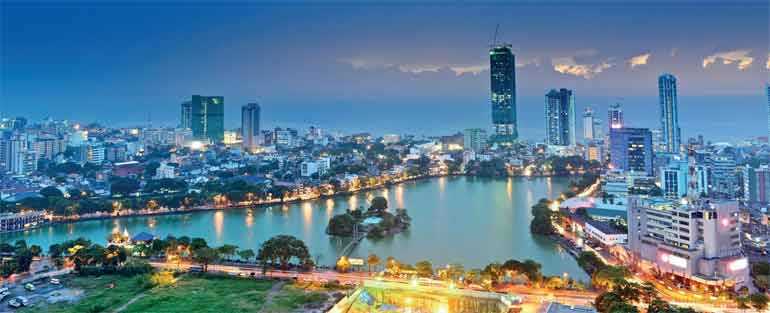Sunday Feb 22, 2026
Sunday Feb 22, 2026
Wednesday, 22 April 2020 00:38 - - {{hitsCtrl.values.hits}}

The total economic shock to Sri Lanka from the Easter Sunday attacks is estimated to be 1% of Gross Domestic Product (GDP) or Rs. 150 billion, rating agency ICRA Lanka said yesterday.
Releasing its latest report on the economic impact of the Easter Sunday attacks, the rating agency, which is a subsidiary of Moody’s Investor Services, calculated that Sri Lanka could have grown by 3.3% in 2019 had it not been for the terror incident. The Central Bank estimated Sri Lanka grew by 2.6% last year, well below its initial estimate of 3.5%.
ICRA Lanka’s analysis indicates the aftermath of the Easter Sunday attacks followed a V-shape recovery. The crisis peaked during Q2. The impact on agriculture was minimal. The manufacturing sector recovered in Q3, while services made a near-complete recovery in Q4.
“The Easter Sunday attacks had a direct impact on the tax base and tax collection. The Government’s relief package included tax concessions (a reduction of VAT to 5%) for affected sectors, especially tourism. An initial estimate indicated on the short run that the direct contribution to the Government revenue by affected sectors like finance, tourism, trade, and construction, would come down by Rs. 50 billion approximately. ICRA Lanka estimates the revenue loss from the taxes on goods and services to be close to Rs. 18 billion,” the report said.
The growth of the agriculture sector was nothing but dismal for the past decade, the report observed. In all quarters except Q1 in 2019, the agriculture sector underperformed, mostly due to unfavourable weather conditions that prevailed during the year. The main impact of the Easter Sunday attacks was transmitted to the agriculture sector through the fisheries subsector, which is the largest component of the agriculture sector (15% in 2018). The impact affected fishing communities, and this delivered a major blow to the fishing industry. The impact of the Easter Sunday attacks caused agriculture to lose 1% of its projected GDP in the Q2 and 0.8% in the next. This shock translates to about Rs. 5 billion.
Close to 60% of the gross value added to the industry sector comes from the manufacturing activities. Following the Easter Sunday attacks, manufacturing sector activities plunged across the board, immediately dragging the quarterly growth rate down. In the last week of April, due to security concerns and supply disruptions, there was a significant drop in production activities.
In the subsequent months, the manufacturing sector functioned overtime and on weekends to clear backlogs and to supply new orders, which led to a faster recovery of the industrial sector within the quarter itself. In ICRA Lanka’s assessment, the Easter Sunday attack shock caused the industry sector to lose about 2% of its projected GDP in Q2. The total shock on the industry sector is around Rs. 18 billion.
The services sector enjoyed a solid growth over the years (averaging 5.6% per quarter for last 10 years) but lost the momentum after the Easter Sunday attacks. In Q2 it only grew by 0.7%. The sector started recovering in subsequent quarters, and by Q4, with improving tourist arrivals, the sector saw an almost full recovery.
The sector experienced a deterioration in activities in the weeks following the Easter Sunday attacks. Sectors related to tourism, especially accommodation (2018 sector share 3%) suffered the most impact (10% decline on Q/Q) from the Easter Sunday attacks. The education sector, which is comparable in size to the accommodations sector, also felt a considerable impact (4% decline on Q/Q).
The largest component of the sector, wholesale and retail trade activities (2018 sector share 19%) also decelerated, as the normal day-to-day lives of the people were disrupted. Transport and warehousing sector, which is similar in size to wholesale and retail trade, also suffered a significant impact (1.3% decline on Q/Q). This is mainly due to the drop in tourism where many vehicles were deployed. Health sector activities were also subdued, as fear drove people to avoid public places such as hospitals (0.9% decline Q/Q).
Overall productivity of the sector declined due to sentiment and stringent security measures that prevailed following the Easter Sunday attacks. Employers in accommodation, food and beverage, and other personal services sectors laid off part of their workforce to minimise their losses.
However, by the end of Q2, the sector was showing signs of recovery. The Government announced a one-year debt moratorium and subsidised working capital for the tourism sector as a slew of measures to help revive the tourism industry. These measures may have helped to speed up the recovery in the subsequent quarters.
The shock caused by Easter Sunday attacks costed nearly 3% of the projected quarterly GDP of the sector in Q2, 1.4% in Q3, and less than 1% in Q4. Unlike in the agriculture and industry sectors, the impact of the shock lasted for three quarters straight, making the service sector the hardest hit of all. The total loss to sector GDP was over Rs. 108 billion.